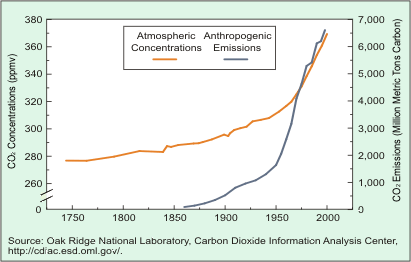Carbon dioxide levels set record again
Carbon dioxide levels set record again
mongabay.com
November 4, 2006
Atmospheric concentrations of the greenhouse gas carbon dioxide reached record levels in 2005 according to the World Meteorological Organization (WMO).
The U.N. organization said that carbon dioxide (CO2) levels now stand at 379.1 parts per million (ppm), up 0.53 percent from 377.1 ppm in 2004.
WMO also found that atmospheric nitrous oxide concentrations, another heat-trapping gas, also reached record levels, up 0.19 percent 319.2 parts per billion (ppb) from 318.6 ppb. Methane levels remained stable at 1873 ppb, after rising slightly between 2002 and 2003.
Atmospheric CO2 levels have climbed by more than 35 percent since the beginning of the industrial revolution. Fossil fuel combustion, which releases carbon dioxide into the atmosphere, and land-use change, including deforestation, is blamed for the rise. Roughly 75-80 percent of anthropogenic carbon dioxide results from fossil fuel burning, while about 20-25 percent is produced by deforestation. The United States, the world’s largest economy and consumer of energy, produces about 24% of global carbon dioxide emissions.

|
Currently carbon dioxide levels are 27 percent higher than at any point in the last 650,000 years, according to research published a year ago in the journal Science.
Scientists believe rising levels of carbon dioxide and other greenhouse gases are causing Earth’s atmosphere to warm. Research released earlier this year by NASA, WMO, and the National Academy of Sciences found that 2005 was the warmest year in at least the 400 years, and possibly much longer. The WMO says that carbon dioxide has accounted for 90 percent of warming over the past decade.
The Intergovernmental Panel on Climate Change (IPCC) projects that atmospheric carbon dioxide levels could rise to 450-550 ppm by 2050, possibly resulting in higher temperatures, rising sea levels, stronger storms and hurricanes, and expanding deserts.
The WMO announcement comes on the eve of UN climate talks in Nairobi, Kenya. At the negotiations a coalition of developing countries is expected to propose a plan to seek compensation from industrialized countries in exchange for conserving their forests to offset carbon dioxide emissions. Researchers say such carbon finance offers the potential to fight global warming while at the same time conserving biodiversity, safeguarding ecosystems services, and helping to alleviate poverty in some of the world’s poorest countries.

Global carbon-dioxide concentrations with anthropogenic emissions, 1750-2000.
This article uses quotes and information from BBC News and previous mongabay.com articles.